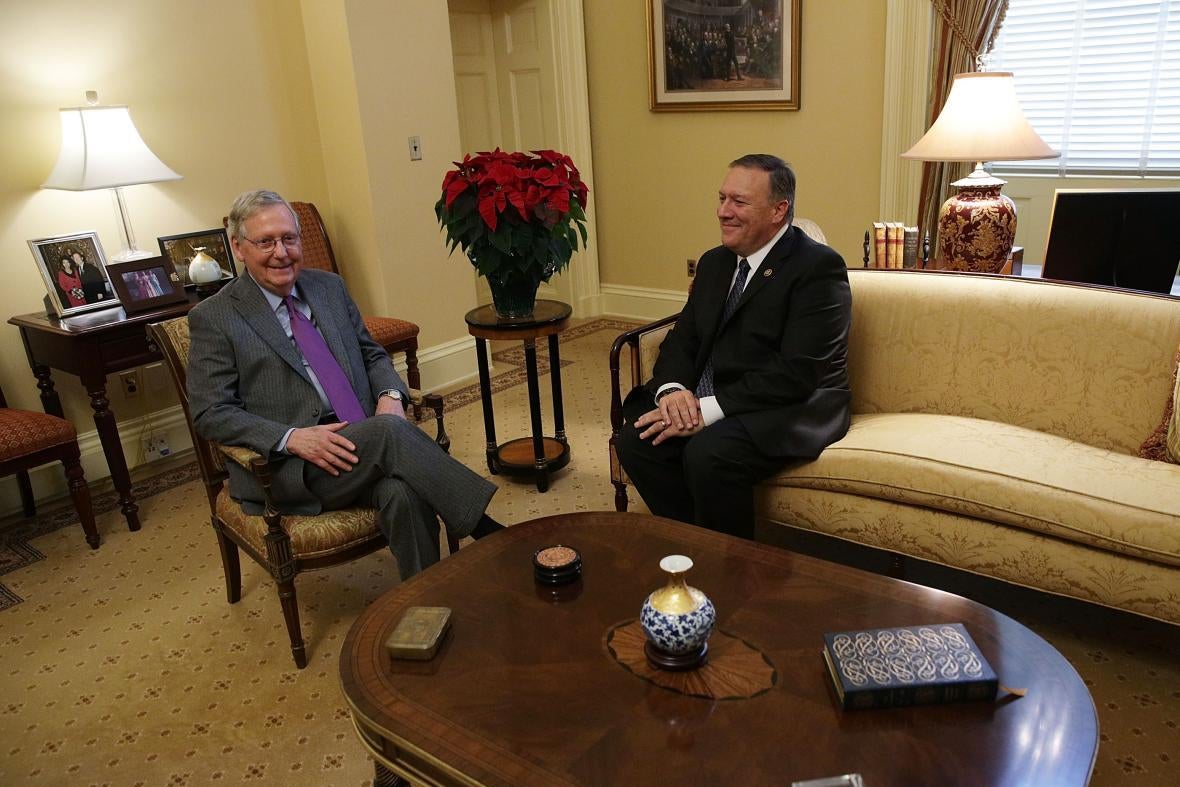In June 2015, Rep. Mike Pompeo, a Kansas congressman, headlined a “God and Country Rally” at Wichita’s Summit Church. “To worship our lord and celebrate our nation at the same place is not only our right, it is our duty,” he began. Pompeo’s speech was a mishmash of domestic culture war callouts and dark warnings about the danger of radical Islam. He cited an inflammatory prayer that a pastor named the Rev. Joe Wright once delivered before the Kansas State Legislature: “America had worshipped other Gods and called it multiculturalism. We’d endorsed perversion and called it an alternative lifestyle.” He lamented government efforts to “rip faith from our schools” and then segued immediately into a discussion of the jihadi threat: “This evil is all around us.” Pompeo concluded by describing politics as “a never-ending struggle … until the rapture.”
Donald Trump has appointed Pompeo to head the CIA; his confirmation hearings begin on Thursday. If a normal Republican president had nominated a figure like this to head the country’s major foreign intelligence agency, there likely would have been a lot of attention paid to his apocalyptic religiosity and Manichaean worldview. Amid the fire hose of lunacy that is the Trump transition, however, Pompeo’s extremism has been overlooked. It’s worth pausing to appreciate the fact that America’s CIA will shortly be run by a man who appears to view American foreign policy as a vehicle for holy war.
Like Trump, Pompeo has been a fierce critic of efforts to rein in the CIA’s torture program and a champion of keeping Guantanamo Bay open. While in Congress, he was a frequent guest on the radio show of famously paranoid Frank Gaffney, a man disinvited from the right-wing Conservative Political Action Conference after claiming that the Muslim Brotherhood had infiltrated its parent organization, the American Conservative Union. (In the Trump era, Gaffney has been brought in from the cold: After the election, the New York Times reported that he was informally advising Trump’s inner circle on national security hires.) Gaffney once called Pompeo “one of the most intelligent men I know in public life,” and the two see the world similarly. In February 2015, they spoke about President Obama’s use of the term “violent extremism” instead of “radical Islam,” a linguistic choice that some on the right see as a secret message of solidarity with jihad. Gaffney suggested that Obama might be conveying “an affinity” for ISIS’s cause, if not all its tactics: “the raising up of the Muslim Ummah, a grand rebalancing of America’s role in the world.” Pompeo relied, “Frank, every place you stare at the president’s policies and statements, you see what you just described … every policy of this administration has treated America as if we are the problem and not the solution.”
Like Gaffney, Pompeo believes that radical networks have wormed their way into every corner of the country. “There are organizations and networks here in the United States tied to radical Islam in deep and fundamental ways,” he said on Gaffney’s show. “They’re not just in places like Libya and Syria and Iraq, but in places like Coldwater, Kansas, and small towns all throughout America.”
Occasionally, Pompeo gestures at the idea that not all Muslims are the enemy but he’s often quick to assign collective guilt. In June 2013, he took to the House floor to falsely accuse Muslim leaders of failing to condemn terrorism in the wake of the Boston Marathon bombing. “When the most devastating terrorist attacks on America in the last 20 years come overwhelmingly from people of a single faith, and are performed in the name of that faith, a special obligation falls on those that are the leaders of that faith,” he said. Then he added: “The silence in the face of extremism coming from the best-funded Islamic advocacy organizations and many mosques across America is absolutely deafening. It casts doubt upon the commitment to peace by adherents of the Muslim faith.”
In 2014, Pompeo appeared on a Family Research Council podcast along with the group’s president, Tony Perkins. Both were indignant at Obama’s claim that America isn’t engaged in a clash of civilizations with the Muslim world. “It is in fact a clash of civilizations!” said Perkins. “This is exactly what we’re facing here, and if he is unwilling to acknowledge that, how in the world do you protect Western civilization?” Pompeo responded: “In Western thought, there is this idea that you can’t address an evil absent calling it by its name. President Reagan understood that. President Bush, although he did not complete the mission, I think he understood that deeply.” Perhaps someone in the Senate can ask him how he plans to complete George W. Bush’s mission when he gets to the CIA.
